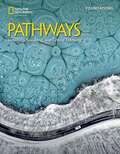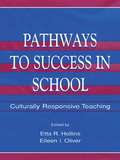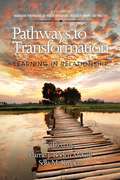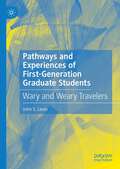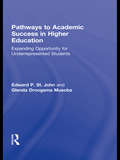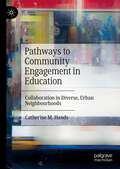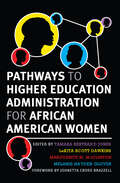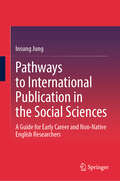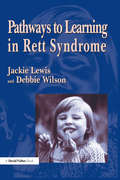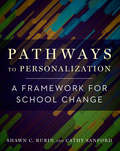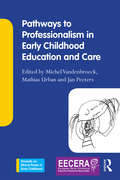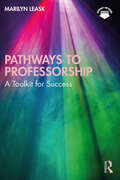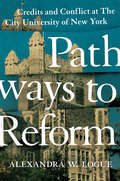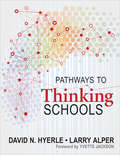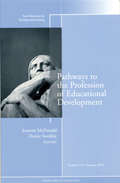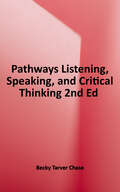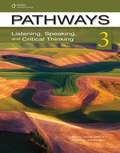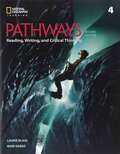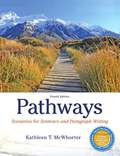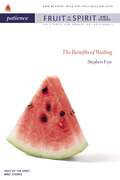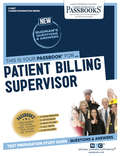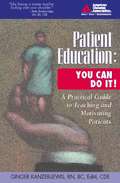- Table View
- List View
Pathways Listening, Speaking, and Critical Thinking Foundations with the Spark Platform
by Mari Vargo Laurie Blass Cynthia Fettig Kristin ShermanPathways is a best-selling, five-level academic skills series that combines highly visual, real-world content and rigorous language instruction to help students develop the skills, language, and critical thinking they need for academic success. Exploring academic topics through authentic videos, photos, and infographics, students connect to ideas while building academic competence skills through collaboration, communication, and problem-solving. Pathways helps students to improve the academic and interpersonal skills needed to succeed in and out of the classroom.
Pathways To Success in School: Culturally Responsive Teaching
by Etta R. Hollins Eileen I. OliverThis text is designed to help preservice and in-service teachers identify pathways to productive teaching and learning for students from culturally and experientially diverse backgrounds. To better serve an increasingly diverse population, teachers need to be competent in selecting and developing culturally responsive curricula and instructional approaches that better facilitate learning for all students. They must be able to attend to diversity within and across cultural groups, and validate students' cultural knowledge acquired outside the classroom. To provide equitable access to learning, they must be able to strategically select or develop instructional approaches that build upon their students' learning propensities, cognitive schemata, experiential backgrounds, and perceptions. The chapter authors in this text present ways of understanding ones' own thinking (metacognition), and ways of thinking about teaching and learning situations and constructing productive strategies. The reader is engaged in: *Learning about the context in which he or she will practice, *Understanding key aspects of student's cultural and experiential background and learning preferences, *Exploring ways to bring these factors together in framing and selecting meaningful curriculum content and learning experiences. The volume is organized into three interrelated sections: Part I presents two approaches to becoming a competent practitioner; Part II offers approaches to developing and using culturally relevant pedagogy; Part III addresses curriculum content and design. Helpful pedagogical features are included to facilitate its use as a textbook: Each of the three main parts begins with an overview that provides an introduction and summary of the main ideas addressed and the relationship among ideas presented by different authors; each chapter opens with focus questions and concludes with suggested learning experiences; chapter-end references may be used to expand the reader's knowledge in specific areas.
Pathways To Transformation: Learning In Relationship
by Carrie J. Boden Sola M. KippersPathways to Transformation: Learning in Relationship is an edited collection that synthesizes current research on transformative learning and expands the current knowledge-base. This book is timely and significant as it provides a synthesis of some of the most exciting research in two fields: adult education and human services. The objectives of this themed edited collection, Pathways to Transformation: Learning in Relationship, are threefold. First, this collection serves as a space to synthesize current research on transformative learning. Through an extensive literature review, the editors have discerned several important strands of research in the area of transformative learning and solicited chapters dealing with these topics. The second objective of the collection is to expand the current knowledge-base in the area of transformative learning by creating a space for dialog on the subject and bringing together diverse voices. The third objective of the collection is to transcend the field of adult education, with a specific goal to reach an audience in human services (psychology, counseling, social work, marriage and family therapy).
Pathways With Purpose
by Sarah J. RoyerWhen I started thinking about building a Faith-based curriculum for the early childhood classroom; my goal was to create a curriculum that would catch the interest of children 0- Kindergarten. See, I have worked in the early childhood classroom for almost two decades and while the goal is at the heart of the curriculum I have used; the interest it has sparked in our young ones is mild and dulled down, at best. How can we best instill an excitement to learn in our young ones? By making the material and manipulatives hands- on and exciting! I don’t mean by reading a story and pulling out paper puppets on craft sticks, although this may be what some children like and want to explore. What I mean is presenting values and morals in an explorative manner, in conjunction with developmentally appropriate learning standards that help engage your students in learning experiences while getting them excited! <P><P>Including stories and sensory materials, story buckets, role playing with dress up materials, including a variety of mixed media to spark your student’s interests is absolutely necessary. Create an environment that appeals to learners of various ages, backgrounds, and learning styles! Make your lesson times fun and interesting and your learners will gravitate back for more!
Pathways and Experiences of First-Generation Graduate Students: Wary and Weary Travelers
by John S. LevinThis book focuses on first-generation graduate students in the US and the graduate or post-baccalaureate programs that house and educate these students. The several voices in this book, including first-generation graduate students, address the phenomena of graduate students’ experiences and related university practices, with the practices connected to traditional academic and Western values and to academic and neoliberal institutional logics. First-generation graduate students’ narratives, or testimonies, serve as the foundation of the analysis of students’ pathways to graduate school and their experiences within graduate school. The conditions for first-generation graduate students in their programs require remedies that will facilitate student well-being, peer community attachment, and persistence, and will educate and train students for achievement in graduate school and for employment after graduate school.
Pathways for Remembering and Recognizing Indigenous Thought in Education: Philosophies of Iethi'nihstenha Ohwentsia'kekha (Land)
by Sandra StyresIndigenous scholars have been gathering, speaking, and writing about Indigenous knowledge for decades. These knowledges are grounded in ancient traditions and very old pedagogies that have been woven with the tangled strings and chipped beads of colonial relations. Pathways for Remembering and Recognizing Indigenous Thought in Education is an exploration into some of the shared cross-cultural themes that inform and shape Indigenous thought and Indigenous educational philosophy. These philosophies generate tensions, challenges, and contradictions that can become very tangled and messy when considered within the context of current educational systems that reinforce colonial power relations. Sandra D. Styres shows how Indigenous thought can inform decolonizing approaches in education as well as the possibilities for truly transformative teaching practices. This book offers new pathways for remembering, conceptualizing and understanding these ancient knowledges and philosophies within a twenty-first century educational context.
Pathways to Academic Success in Higher Education: Expanding Opportunity for Underrepresented Students
by Edward P. St. John Glenda Droogsma MusobaPathways to Academic Success in Higher Education examines two major challenges facing the nation. The first is preparing high school students for college, a reform that has been tackled largely through state policy initiatives. The second is creating new pathways to academic success for underrepresented students in higher education, a challenge that must be addressed within a decentralized system of higher education. Part one: Presents and documents key findings from research on K-12 education policy. Part two: Provides action research using a state data system to inform colleges and universities. Part three: Focuses on the future of policy and organizational initiatives to improve opportunity. This book integrates studies conducted over nearly a decade and offers guidance on how best to understand and promote retention and success once students have gained access.
Pathways to Community Engagement in Education: Collaboration in Diverse, Urban Neighbourhoods
by Catherine M. HandsThis book takes a comprehensive look at community engagement strategies in education to demonstrate the diverse nature of school-community relations and their value to promote their effective development. The author brings twenty years of experience in various educational settings in Ontario and California to examining community involvement policies and their interpretation, as well as school-community collaboration in practice. Chapters include recent research on school-community collaboration from the perspective of teachers, school district leaders, administrators, and support staff within two school districts in a low-income and culturally diverse urban community. The book also includes perspectives from community members involved in organizations across the city with a mandate to work with youth. In a time where students’ academic, social, and emotional support needs are on the rise, this book offers a valuable resource for strengthening school-community relations and demonstrating the power of collaboration.
Pathways to Higher Education Administration for African American Women
by Tamara Bertrand Jones LeKita Scott Dawkins Marguerite M. McClinton Melanie Hayden GloverFor Black women faculty members and student affairs personnel, this book delineates the needed skills and the range of possible pathways for attaining administrative positions in higher education.This book uses a survey that identifies the skills and knowledge that Black women administrators report as most critical at different stages of their careers as a foundation for the personal narratives of individual administrators’ career progressions. The contributors address barriers, strategies, and considerations such as the comparative merits of starting a career at an HBCU or PWI, or at a public or private institution.Their stories shine light on how to develop the most effective leadership style, how to communicate, and the importance of leading with credibility. They dwell on the necessity of listening to one’s inner voice in guiding decisions, of maintaining integrity and having a clear sense of values, and of developing a realistic sense of personal limitations and abilities. They illustrate how to combine institutional and personal priorities with service to the community; share how the authors carved out their distinct and purposeful career paths; and demonstrate the importance of the mentoring they received and provided along the way. A theoretical chapter provides a frame for reflecting on the paths traveled. These accounts and reflections provide enlightenment, inspiration, and nuggets of wisdom for all Black women who want to advance their careers in higher education.
Pathways to International Publication in the Social Sciences: A Guide for Early Career and Non-Native English Researchers
by Insung JungThis guide offers a clear step-by-step approach for graduate students and early-career researchers, especially non-native English speakers, seeking to publish in international journals in the social sciences. It provides practical strategies for preparing, submitting, and refining research papers, helping researchers navigate the challenges of academic publishing. With 21 chapters, the guide covers every stage of writing, revising, and submission, while addressing the unique obstacles faced by non-native English speakers. The guide helps researchers identify reputable journals, avoid predatory ones, and use digital tools to meet international standards. It then provides a structured roadmap that simplifies the publication process, covering steps like journal selection, writing compelling abstracts, and drafting the methods and results sections. By the end of the guide, it is expected that researchers will have a strong first draft or, ideally, a submission-ready manuscript. The guide also addresses language barriers, cultural differences, and unfamiliarity with international conventions. It offers practical solutions for improving English writing, utilizing digital tools, responding to peer reviews, and managing revisions effectively. It emphasizes ethical guidelines like avoiding plagiarism, properly crediting co-authors, and ensuring research transparency to help researchers meet global standards. Unlike other research guides, this one is specifically tailored to early career and non-native English researchers working in social science disciplines. It offers practical strategies and real-world examples to equip researchers—and teachers of research methods and academic writing—with a framework for achieving publishing success in global academia.
Pathways to Learning in Rett Syndrome
by Debbie WilsonFirst Published in 1998. Routledge is an imprint of Taylor & Francis, an informa company.
Pathways to Personalization: A Framework for School Change
by Shawn C. Rubin Cathy SanfordPathways to Personalization offers an innovative five-step framework to help school leaders and teacher teams design and implement blended and personalized learning initiatives based on local needs and interests. The book draws on principles of improvement science and change management, as well as work in nearly five hundred classrooms, to help educators define their own rationale for personalized learning; it guides them as they establish small pilot initiatives, determine criteria for success, evaluate their efforts, and create a path for replication and scale. Filled with activities and templates for organizing information and student feedback, the book also includes many examples of how district leaders, school principals, and teachers have successfully navigated the change process to create more student-centered classrooms. Shifting a school or district to offer more personalized learning requires a great deal of commitment, passion, and energy, but it also demands a strategic process. Pathways to Personalization meets this need by providing a field-tested road map for educators seeking ways to meet the academic and emotional needs of all students, and to empower them to take charge of their own learning.
Pathways to Professionalism in Early Childhood Education and Care (Towards an Ethical Praxis in Early Childhood)
by Mathias Urban Michel Vandenbroeck Jan PeetersPathways to Professionalism in Early Childhood Education and Care is concerned with a growing interest from policy and research in the professionalisation of the early childhood workforce. Illustrated by in-depth case studies of innovative and sustainable pathways to professionalisation, it recognises the importance of a systemic approach to professionalisation across all levels of the early childhood. The authors of this wide-ranging book share insights of professionalism from various European countries and suggest that professionalism in early childhood unfolds best in a ‘competent system’. This book considers a broad range of international issues including Continuous professional support and quality Early Childhood education and care staff with different qualifications in professional development processes. How personal attitudes and competence of educators are related to the wider system of competent teams, leadership, collaboration across services and competent governance From research to policy: the case of early childhood and care Pathways to Professionalism in Early Childhood Education and Care is a crucial and fascinating read for professionals working in the sector and contributes to broadening views on what professionalism in early childhood can mean within a ‘competent system’.
Pathways to Professorship: A Toolkit for Success
by Marilyn LeaskPeople who become professors are experts in their field. But how does a new academic, aspiring to become a professor, choose a field of study and plan a career that leads to professorship? This practical book answers this question, guiding aspiring academics step by step through the areas in which they need to demonstrate excellence if they are to gain the international recognition and professional profile which leads to a professorial post. Each chapter highlights real-life, internationally applicable examples of what successful achievements look like and what pitfalls to be aware of. Supported by an international survey of professors and their experiences working within university systems, the chapters outline key topics relevant to any aspiring professor. For example: Criteria for obtaining a professorship Carving out a specialist research niche Establishing an international reputation Advice on getting your research published Undertaking impactful research and winning funding Networking and developing a media presence Balancing research, teaching and your personal life This must-have book is filled with tips and practical advice for building an academic career and is an essential read for anyone looking to better understand routes into professorship.
Pathways to Reform: Credits and Conflict at The City University of New York
by Alexandra W. LogueA personal account of the implementation of a controversial credit transfer program at the nation's third-largest universityChange is notoriously difficult in any large organization. Institutions of higher education are no exception. From 2010 to 2013, Alexandra Logue, then chief academic officer of The City University of New York, led a controversial reform initiative known as Pathways. The program aimed to facilitate the transfer of credits among the university’s nineteen constituent colleges in order to improve graduation rates—a long-recognized problem for public universities such as CUNY. Hotly debated, Pathways met with vociferous resistance from many faculty members, drew the attention of local and national media, and resulted in lengthy legal action. In Pathways to Reform, Logue, the figure at the center of the maelstrom, blends vivid personal narrative with an objective perspective to tell how this hard-fought plan was successfully implemented at the third-largest university in the United States.Logue vividly illustrates why change does or does not take place in higher education, and the professional and personal tolls exacted. Looking through the lens of the Pathways program and factoring in key players, she analyzes how governance structures and conflicting interests, along with other institutional factors, impede change—which, Logue shows, is all too rare, slow, and costly. In this environment, she argues, it is shared governance, combined with a strong, central decision-making authority, that best facilitates necessary reform. Logue presents a compelling investigation of not only transfer policy but also power dynamics and university leadership.Shedding light on the inner workings of one of the most important public institutions in the nation, Pathways to Reform provides the first full account of how, despite opposition, a complex higher education initiative was realized.All net royalties received by the author from sales of this book will be donated to The City University of New York to support undergraduate student financial aid.
Pathways to Thinking Schools
by David N. Hyerle Lawrence S. AlperGive students the essential thinking skills they need to thrive. Exclusively content-focused teaching may improve test scores, but it leaves students without the cognitive skills for success in an information-overloaded world where deep thinking, collaborative problem solving, and emotional intelligence is essential. In this book, David Hyerle presents case studies of schools and educators who have applied these powerful models, in some case system-wide, to remedy this situation, including: Visual learning tools including Hyerle’s renowned Thinking Maps A language for students to improve their intellectual-emotional behaviors as they learn A system for developing students’ abilities to ask questions in the context of a developing Community of Inquiry
Pathways to the Profession of Educational Development: New Directions for Teaching and Learning, Number 122 (J-B TL Single Issue Teaching and Learning #137)
by Denise Stockley Jeanette McDonaldThe contributors to this volume are academics working directly or indirectly with teaching and learning centers and professional communities, serving in the capacity of educational developer, researcher, or specialist; unit manager or director; or senior administrator. Drawing on survey and interview data, individual experience or perspective, and familiarity with the educational literature, they offer a context to understand and appreciate how the field of educational development, developer practice, and individual pathways have evolved, further highlighting what territory remains to be explored and uncovered. Over the last fifty years, educational development has evolved from an informal set of instructional improvement activities championed by individuals to a scholarly field of study and practice that aims to advance teaching and learning at the individual, institutional and (more recently) sector levels. During this time, educational development work has moved from the fringes to the mainstream of the higher education landscape, bringing to the community a diverse group of dedicated academic professionals. This volume draws on their experience and insight to provide an invaluable guide to future challenges and issues. This is the 122nd volume of the Jossey-Bass higher education quarterly report series New Directions for Teaching and Learning, which offers a comprehensive range of ideas and techniques for improving college teaching based on the experience of seasoned instructors and the latest findings of educational and psychological researchers.
Pathways: Listening, Speaking, and Critical Thinking 1
by Becky Tarver ChasePathways, Second Edition, is a global, five-level academic English program. Carefully-guided lessons develop the language skills, critical thinking, and learning strategies required for academic success. Using authentic and relevant content from National Geographic, including video, charts, and other infographics, Pathways prepares students to work effectively and confidently in an academic environment.
Pathways: Listening, Speaking, and Critical Thinking 3
by Kristin L. Johannsen Rebecca Tarver Chase Milada Broukal Paul MacintyreThis is the new five-level academic skills series that features reading & writing and listening & speaking strands to help learners develop the language skills needed to achieve academic success.
Pathways: Reading, Writing, and Critical Thinking 4
by Mari Vargo Laurie BlassPathways, Second Edition, is a global, five-level academic English program. Carefully-guided lessons develop the language skills, critical thinking, and learning strategies required for academic success. Using authentic and relevant content from National Geographic, including video, charts, and other infographics, Pathways prepares students to work effectively and confidently in an academic environment.
Pathways: Scenarios For Sentence And Paragraph Writing
by Kathleen T. McWhorterA lively, integrated approach that emphasizes the connection of the reading and writing processes Pathways: Scenarios for Paragraph and Sentence Writing, Fourth Edition teaches fundamental sentence and paragraph writing skills by engaging student interest, maintaining a focus on expressing ideas rather than on following rules. Students learn grammar in the context of the “whole paper.” Seven of the 17 chapters deal with grammar topics; in these chapters, students examine student essays, read and respond to ideas, and write and revise paragraphs. In Parts II through IV, students apply what they have learned about sentence-level correctness to their own writing as they explore logical paragraph development and organization of ideas. The last two chapters introduce essay writing, enabling students to accelerate from paragraphs to essays, with the goal of achieving stronger, more fully developed writing skills.
Patience: The Benefits of Waiting (Fruit of the Spirit Bible Studies)
by Stephen Eyre“Lord, I want patience, and I want it right now!” It is easier to joke about patience than to become patient. You can tell that God is growing patience in you when you run into frustrating experiences; when others fail to meet your expectations; when people you depend on let you down. Most of all, you know you are learning patience when you call out to the Lord for help and he seems to be on vacation. In the face of such trials, the Bible tells us that patience is worth the wait. This Fruit of the Spirit Bible study helps you discover the benefits of waiting.The eight-volume Fruit of the Spirit Bible Studies series not only helps you discover what the Bible says about the vital traits that the Holy Spirit produces in believers, but also moves you beyond reflection and discussion to application. Designed for use in small groups or personal devotions, the interactive format will help you grow in your ability to reflect the character of Jesus.Revised to include:Expanded leader’s notesBetween-studies applicationsSuggestions for prayer
Patient Billing Supervisor: Passbooks Study Guide (Career Examination Series #C-3607)
by National Learning CorporationThe Patient Billing Supervisor Passbook® prepares you for your test by allowing you to take practice exams in the subjects you need to study. It provides hundreds of questions and answers in the areas that will likely be covered on your upcoming exam, including but not limited to; Understanding and interpreting written material; Office record keeping; Arithmetic computation; Supervision; and more.
Patient Education: You Can Do It!
by Ginger Kanzer-LewisInformation for motivating people to learn, assessing learning needs, evaluating teaching techniques & classes, making learning fun for both teacher & students, developing an education class or entire education program & teaching colleagues how to teach.
Patient Treatment Adherence: Concepts, Interventions, and Measurement
by Hayden B. Bosworth Eugene Z. Oddone Morris WeinbergerThis new book summarizes the adherence literature for a number of specific health behaviors and populations. It provides a comprehensive source on the conceptualization, interventions, and measurement of treatment adherence and a synthesis of the research across demographic and chronic diseases. The text presents problems associated with treatment adherence; theoretical models that have commonly been used to understand, predict, and/or improve adherence; adherence with specific behaviors including exercise, diet, rehabilitation, medication, and psychological therapies; and strategies in enhancing adherence.Because chronic diseases involve similar behaviors, the handbook is organized by specific behaviors and special populations, and not by disease. Every chapter is sub-organized by specific diseases to ensure easy access for the readers and features a discussion of adherence across demographic and chronic conditions, a review of previous interventions directed at the particular behavior or population, questions and scoring algorithms for widely used measures of treatment adherence, a discussion of the clinical research, and where appropriate, policy implications. Patient Treatment Adherence addresses: practical recommendations to improve adherence; the impact of non-adherence including costs and health-related quality of life; methodological issues such as assessing cost-effectiveness; and the use of technological advances to improve adherence.Intended for health service professionals, health, clinical, social, and cognitive psychologists, primary care physicians, pharmacists, and policy-makers, this text is also an excellent resource for graduate courses on health psychology and public health.
